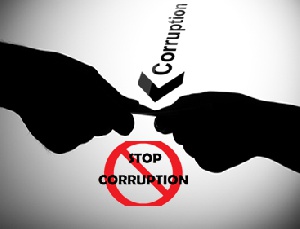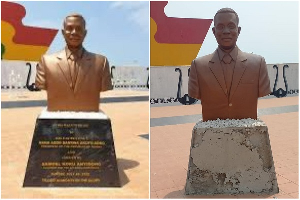Experts are calling for collective action to help curtail corruption in Africa’s maritime industry.
This comes on the back of successes chalked up by the collective action project launched in Nigeria, which sought to improve the business climate and reduce corruption in the port and maritime sector.
Since 2013, the Maritime Anti-Corruption Network (MACN) has been working with local stakeholders from the private and public sectors to implement actions that will lead to fairness and transparency in Nigeria’s port and maritime sector.
The project is said to have received high-level support from private sector stakeholders as well as government all the way up to the Nigerian presidency.
Some core activities of the project and achievements to date include: the development of an SOP toolkit for the private and public sector to help integrate standard operating procedures in daily operations; establishment of the Help Desk in collaboration with the Nigerian Shippers Council’s grievance mechanism; and development of a National Port Integrity Index for Nigeria and Global Port Integrity Platform to measure the level of integrity in ports worldwide and promote a culture of integrity.
A similar procedure, according to an Associate Director, Global Operations and Industry Engagement-MACN, Vivek Menon, is worth emulating in Ghana like other countries within the West and Central African sub-region.
Speaking on the Eye on Port programme, Mr. Menon indicated that preparations to initiate this project in Ghana has begun in earnest.
“The MACN expansion project is looking at West and Central Africa to start with. We want to work with various agencies and governments in the region. This is already initiated. The conference we hosted in Ghana with help from the Ghana Maritime Authority was instrumental in showcasing our next step. We want to take that further in the coming months and years. We will see more work being done in Ghana and the neighbouring countries,” he revealed.
The Maritime Anti-Corruption Network representative however indicated that corruption-related activities in the maritime sector are a global phenomenon and not restricted to Africa, describing it as “a pandemic that never goes away without a vaccination”.
“We have data from all over the world which show that no country or port is immune to this challenge. The data demonstrate that there are about 53,000 incidents from 151 countries affected by this problem in about 1,200 ports and terminals,” he explained.
He emphasised that data is at the core of his outfit’s work, and findings, resolutions and progress are data-driven in collaboration with all stakeholders.
“When MACN was established, it started off with what we call an anonymous incident data reporting system. 11 years on, we have been collecting this data. It is not a perception of what happened in an interaction with a public official, or how one feels, but what transpired in itself.”
Contributing to the subject, CEO of the Centre on Business Integrity (CBI) Nigeria, Soji Apampa, supported the cause to replicate the Collective Action Project in Ghana – sounding off the maxim “If it can work in Nigeria it can work anywhere else, especially dealing with corruption”.
He said Ghana can consolidate its burgeoning reputation in the maritime business arena by taking on this initiative.
“Ghana is already very well-positioned in West Africa when it comes to the Africa Continental Free Trade Area (AfCFTA). Ghana, with a few changes, can continue its lead in some of the maritime processes where it is seen as being ahead. There is stiff competition going on in West Africa; Ghana should not miss the boat,” Mr. Apampa asserted.
He explained that SOPs for vessel clearance and other maritime-related activities at ports, onshore and offshore, are necessary for cutting cost and promoting fairness in the shipping business.
“You cannot establish an infraction without setting standards. That, we all should agree on. Standards are required so that assessment becomes objective rather than based on discretion of the public officer. That way, the seafarers know exactly when they are wrong.”
These sentiments were further echoed by the Deputy Director in Charge of Surveys and Inspections at the Ghana Maritime Authority (GMA), Captain William Eson Thompson.
According to the official from Ghana Maritime Authority, despite critical efforts the GMA has put in place to ensure their officers do not engage in bribery and corruption during their activities, he cannot necessarily vouch for the industry as a whole.
He said ship captains and agents are often the perpetrators of corrupt acts in their bid to get away with non-compliance.
“For instance, during port state control an inspector gets on board a ship and finds out there are some deficiencies – and some of these deficiencies come as violations of our maritime pollution act and are therefore accompanied by heavy fines, let’s say US$60,000. In addition to that, the deficiency will be recorded into a database that will label the said vessel as a high risk ship, which will render the shipmaster liable to questions from the shipping company. He will instead be willing to offer an official about US$10,000 so that he forgoes the infraction,” he cited.
He explained that due to the port set-up and the maritime industry in Ghana constituting various actors with separate mandates, their powers cannot overlap to control others; hence making room for discretionary execution of powers – which can generate corruption, delays and other unfavourable events in the clearance of vessels, for example.
Capt. Thompson concluded: “Just as Vivek and Soji have said, we have to harmonise the processes so that the various institutions can come together and understand each other. The Authority cannot cross the line into GRA, Immigration or GPHA’s jurisdiction and start making rules for them. They all have their various SOPs. Probably, Vivek’s team may have to come in-house and introduce the harmonised system and port manual. That would be very important and make it easy for everyone”.
Business News of Friday, 10 February 2023
Source: thebftonline.com

















